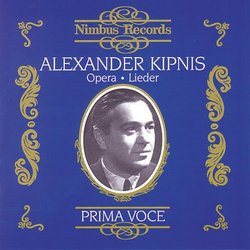| All Artists: Alexander Kipnis Title: Opera & Lieder Recordings Members Wishing: 0 Total Copies: 0 Label: Nimbus Records Release Date: 6/24/1997 Genres: Pop, Classical Styles: Vocal Pop, Opera & Classical Vocal, Historical Periods, Baroque (c.1600-1750), Classical (c.1770-1830), Modern, 20th, & 21st Century Number of Discs: 2 SwapaCD Credits: 2 UPC: 710357788529 |
Search - Alexander Kipnis :: Opera & Lieder Recordings
 | Alexander Kipnis Opera & Lieder Recordings Genres: Pop, Classical
|
Larger Image |
CD Details |
CD ReviewsA bass without Boris? It can be done! Bill Parker | Saint Paul, MN United States | 12/08/2005 (5 out of 5 stars) "There have been exactly four world-famous giants of the bass voice in classical music in the 20th century: Feodor Chaliapin, Boris Christoff, Ezio Pinza, and Alexander Kipnis. Those are the four contenders for the top spot, and all others, no matter how estimable, can but contest for second place in public and critical preference. The Russian Chaliapin, like Maria Callas, achieved his fame as much or more through his histrionic abilities and striking appearance than through vocal beauty; some of his most famous recorded singing moments aren't really even singing! Christoff (a Bulgarian) was his "successor" in similar roles, principally in Mussorgsky's Boris Godunov-less dramatic but vocally more beautiful, a pleasant enough tradeoff. The Italian Pinza was altogether more suave and lyrical, and although he did sing Boris (in Italian while the rest of the cast sang in Russian!), he was better known in Mozart (particularly Don Giovanni) and, of all things, South Pacific. Alexander Kipnis, another Russian (and father of the great harpsichordist Igor Kipnis), is the least known of this quartet to the public today, although his timbre was no less beautiful than the others, and he was probably the most musical of them all. His lesser fame is probably due to the fact that he spent so much of his recording career on art song rather than opera (which is always better box office), and that in opera he had no clear specialty in which he outshone the competition. He too sang the greatest bass role in opera, Tsar Boris, but his studio recordings in the part are unfortunately a shade below his best; it shows great courage on the part of Nimbus to exclude them from their two-disc collection in favor of more flattering examples of his art. Here instead we have his unsurpassed performance of the aria "Wer ein Liebchen hat gefunden" from Mozart's Abduction from the Seraglio, in which his seamless two-octave span is breathtakingly displayed from a cavernous low G on up to an ethereal high D without any strain or dislocation. Kipnis had a distinctive way of expressing tenderness and strength almost simultaneously, and his legato phrasing was peerless-all in clear evidence in the album's opening selection, "Il lacerato spirito" from Verdi's Simon Boccanegra, both noble and opulent in sound. He seemed to be at home in Italian and French opera, Mozart and Wagner, grand opera and operetta, comedy and tragedy, opera and lieder, singing with beauty and intelligence no matter the genre or period. Such versatility was unknown among the other three great basses, who often appeared in garishly unflattering light when straying from their well-honed specialties. Nimbus Prima Voce is to be commended for another judicious culling for their beautifully recorded and packaged series of the greatest singers, and for sticking here to the Kipnis recordings made in the 1920s and early 1930s when his voice was at its very best. " Wonderful singer and great selections Carte1964 | Hartford, CT United States | 11/04/2002 (5 out of 5 stars) "A great CD. Kipnis is one of the all-time greatest basses in recorded history and this is a fantastically diverse and interesting selection of arias and lieder.Many of his great roles are included including Philip II, Simon B., Leporello, Bartolo (Rossini and Mozart), Osmin, Mephistopheles (Gounod), Sachs, Gurnemanz, Wotan.Also, some very nice Schubert and Brahms lieber, including "Erlkonig" and "Aufenthalt". Great to hear "Aufenthalt" done by a true bass.Generally, very good recording quality.This is a great addition to the Prima Voce series." A Great Basso Kathleen O'Neill | Dubuque, Iowa | 12/19/1999 (5 out of 5 stars) "This set is an amazing testimony to one of the amazing voices of the century. Kipnis's versatility, range and artistry are convincingly displayed in both the aria and lieder selections. The transfers from 1928-1930's are excellent as regards the voice and good as regards the piano; the orchestral quality leaves a bit more to be desired.The German versions of standard Italian arias are enough to convince an Original Language purist that vernacular opera can be totally convincing when translated with sufficient musical as well as literary skill. True even of the Verdi selections here; and as regards the Rossini and Mozart "patter songs", why, the German is even funnier - and more difficult - than the original. The panache with which Kipnis whips them off is delightful."
|

 Track Listings (14) - Disc #1
Track Listings (14) - Disc #1